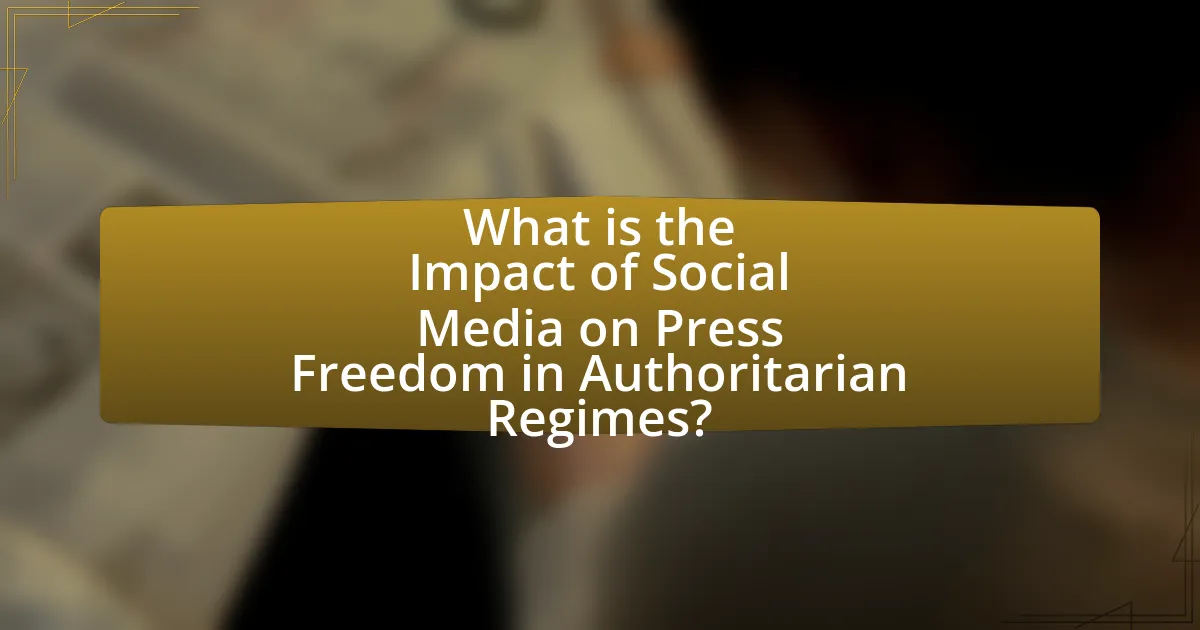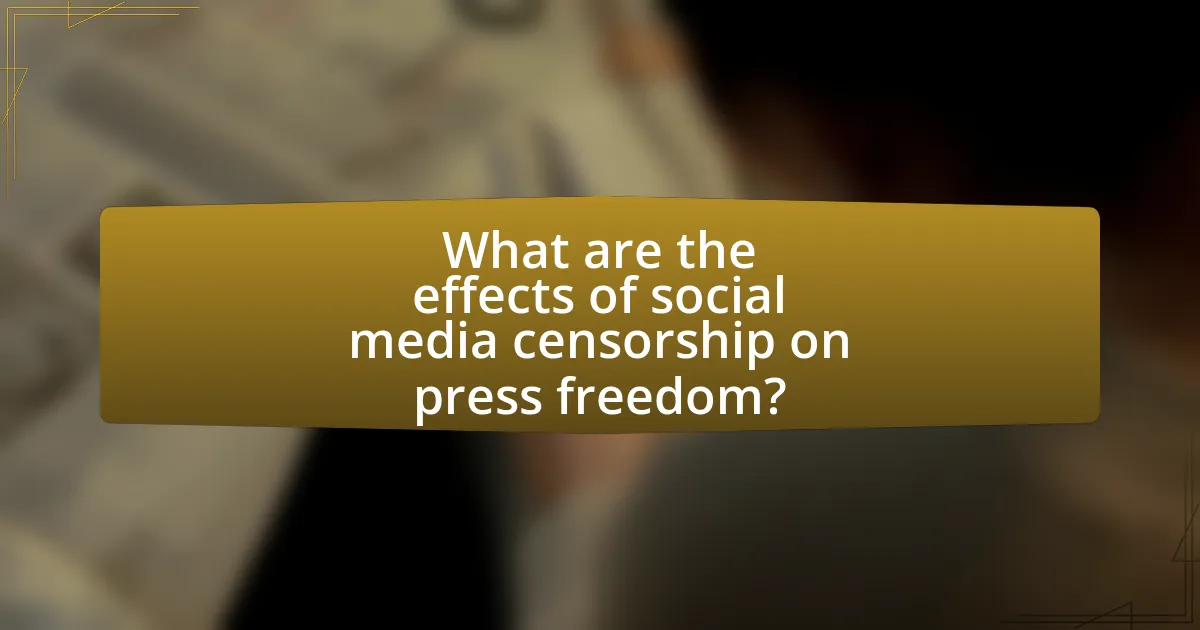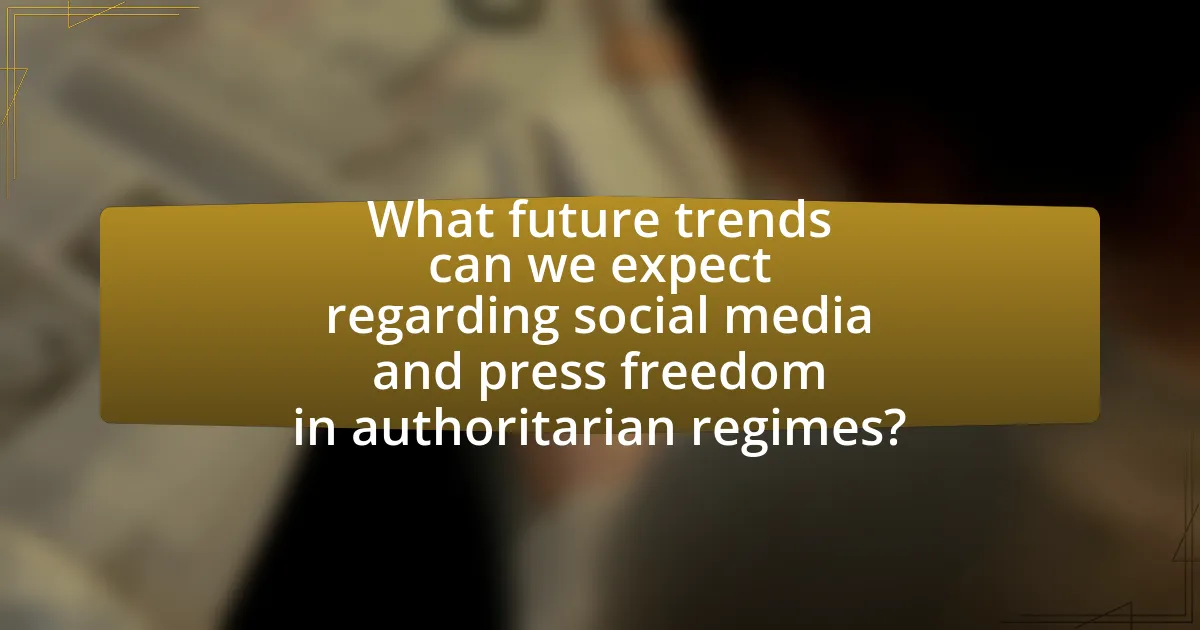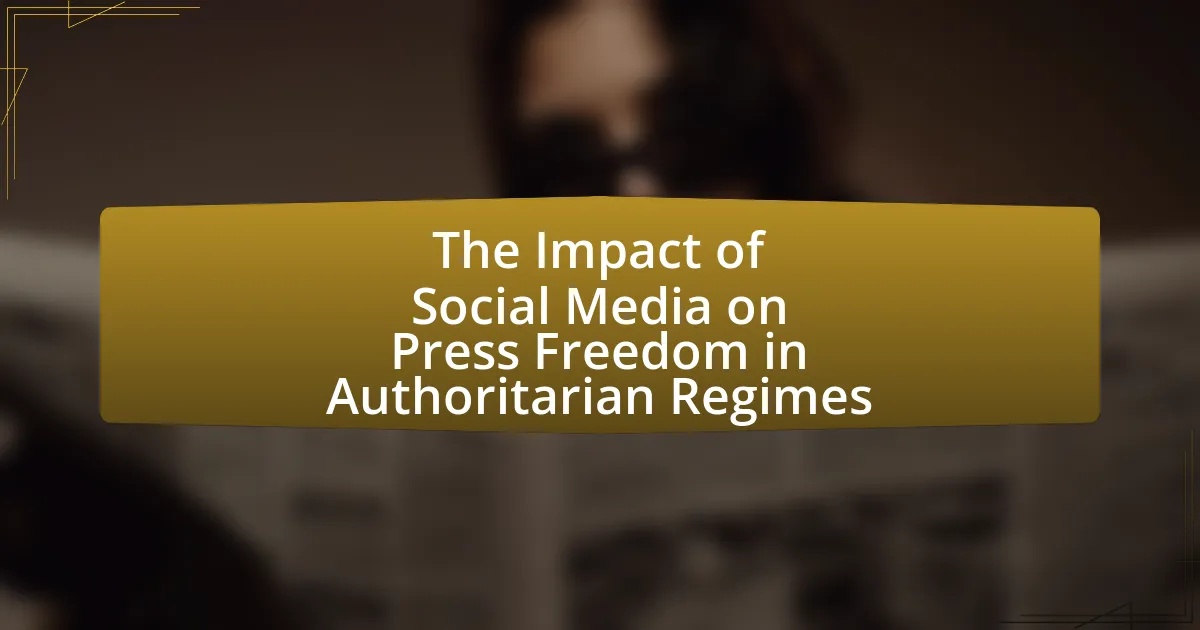The article examines the impact of social media on press freedom in authoritarian regimes, highlighting its role as an alternative platform for information dissemination and citizen journalism. It discusses how social media enables individuals to challenge state narratives, as seen during events like the Arab Spring and the 2009 Iranian elections. However, the article also addresses the responses of authoritarian governments, including increased censorship and surveillance, which complicate the relationship between social media and press freedom. Key themes include the empowerment of activists, the risks faced by journalists, and the implications of social media censorship on public discourse and accountability.

What is the Impact of Social Media on Press Freedom in Authoritarian Regimes?
Social media significantly impacts press freedom in authoritarian regimes by providing alternative platforms for information dissemination and enabling citizen journalism. In countries like Iran and China, where traditional media is heavily censored, social media allows individuals to share news and opinions that challenge state narratives. For instance, during the 2009 Iranian elections, social media played a crucial role in mobilizing protests and sharing real-time updates, despite government attempts to suppress dissent. Additionally, studies indicate that social media can both empower activists and expose government abuses, as seen in the Arab Spring, where platforms like Twitter and Facebook facilitated communication and organization among protesters. However, authoritarian regimes often respond with increased surveillance and censorship of social media, illustrating a complex relationship where social media can both enhance and threaten press freedom.
How does social media influence press freedom in these contexts?
Social media significantly influences press freedom in authoritarian regimes by providing alternative platforms for information dissemination and enabling citizen journalism. In these contexts, traditional media often faces censorship and restrictions, leading to a reliance on social media for news and reporting. For instance, during the Arab Spring, platforms like Twitter and Facebook were instrumental in mobilizing protests and sharing real-time updates, circumventing state-controlled media narratives. This shift allows for greater public engagement and the exposure of government abuses, as evidenced by the increased visibility of dissenting voices and grassroots movements. However, authoritarian governments also adapt by employing surveillance and disinformation tactics to undermine these platforms, illustrating a complex relationship where social media can both empower and threaten press freedom.
What role does social media play in disseminating information?
Social media serves as a crucial platform for disseminating information by enabling rapid communication and broad reach to diverse audiences. It allows individuals and organizations to share news, updates, and opinions instantly, often bypassing traditional media gatekeepers. For instance, during the Arab Spring, social media platforms like Twitter and Facebook were instrumental in spreading information about protests and mobilizing support, demonstrating their power in shaping public discourse and influencing political movements. This role is particularly significant in authoritarian regimes, where state-controlled media may restrict access to information, making social media a vital tool for promoting transparency and accountability.
How does social media challenge traditional media narratives?
Social media challenges traditional media narratives by enabling direct communication and information dissemination from individuals, bypassing established media gatekeepers. This shift allows for diverse perspectives and real-time reporting, often contradicting or supplementing the narratives presented by traditional outlets. For instance, during the Arab Spring, social media platforms like Twitter and Facebook were instrumental in mobilizing protests and sharing on-the-ground experiences that mainstream media often overlooked or misrepresented. This democratization of information empowers citizens to challenge state-controlled narratives, significantly impacting press freedom in authoritarian regimes.
Why is press freedom crucial in authoritarian regimes?
Press freedom is crucial in authoritarian regimes because it serves as a vital mechanism for accountability and transparency. In such political environments, where government actions are often shrouded in secrecy, an independent press can expose corruption, human rights abuses, and policy failures. Historical examples, such as the role of investigative journalism in uncovering the Watergate scandal, illustrate how press freedom can lead to significant political change and reform. Furthermore, studies indicate that countries with higher levels of press freedom tend to experience greater civic engagement and public discourse, which are essential for democratic processes. Thus, press freedom acts as a check on power, fostering a more informed citizenry and promoting social justice in authoritarian contexts.
What are the implications of limited press freedom for society?
Limited press freedom significantly undermines democratic processes and societal well-being. When the media is restricted, citizens lack access to diverse viewpoints and critical information, which can lead to misinformation and a poorly informed public. For instance, according to the 2021 World Press Freedom Index, countries with limited press freedom often experience higher levels of corruption and human rights abuses, as the lack of journalistic scrutiny allows those in power to operate without accountability. Furthermore, limited press freedom stifles public discourse and civic engagement, as individuals may feel discouraged from expressing dissenting opinions or participating in political processes, ultimately weakening the fabric of society.
How does press freedom affect public opinion and political discourse?
Press freedom significantly influences public opinion and political discourse by enabling diverse viewpoints and fostering informed citizen engagement. When the press operates freely, it can investigate and report on government actions, societal issues, and public interests without censorship, which empowers citizens to form educated opinions. For instance, studies have shown that countries with higher levels of press freedom, such as Norway and Sweden, tend to have more informed electorates and robust democratic participation compared to nations with restricted press, like North Korea, where state-controlled media limits public discourse. This correlation illustrates that press freedom not only shapes public perception but also enhances the quality of political debate, leading to more accountable governance.
What are the risks associated with social media use in authoritarian regimes?
The risks associated with social media use in authoritarian regimes include increased surveillance, censorship, and repression of dissent. Authoritarian governments often monitor social media platforms to track opposition activities and identify dissidents, leading to arrests and harassment. For instance, in countries like China and Iran, state authorities employ sophisticated technologies to surveil online communications, resulting in a chilling effect on free expression. Additionally, these regimes may impose strict regulations on social media content, censoring posts that criticize the government or promote democratic ideals. This suppression of information undermines press freedom and limits public discourse, as seen in Turkey, where social media platforms have faced shutdowns during political unrest.
How do governments respond to social media’s influence on press freedom?
Governments often respond to social media’s influence on press freedom by implementing restrictive measures, including censorship, surveillance, and legal actions against journalists and platforms. For instance, authoritarian regimes may block access to social media sites or impose strict regulations that limit the dissemination of information deemed unfavorable to the state. A notable example is China’s Great Firewall, which restricts access to foreign social media platforms and censors content that contradicts government narratives. Additionally, countries like Russia have enacted laws that penalize the spread of “fake news,” effectively curbing dissenting voices and controlling the narrative online. These actions demonstrate a clear strategy to mitigate the challenges posed by social media to traditional press freedom, reinforcing state control over information.
What are the consequences for journalists and activists using social media?
Journalists and activists using social media face significant consequences, including increased surveillance, harassment, and legal repercussions. In authoritarian regimes, governments often monitor social media activity to identify dissenters, leading to arrests or intimidation of those who express opposition. For instance, a report by the Committee to Protect Journalists highlighted that in countries like Turkey and Egypt, social media posts have resulted in journalists being jailed for “spreading misinformation” or “insulting the state.” Additionally, activists may experience online harassment that can escalate to physical threats, as seen in various cases where social media exposure has led to targeted violence. These consequences illustrate the risks associated with utilizing social media as a platform for advocacy and reporting in oppressive environments.
How does social media serve as a tool for resistance in authoritarian regimes?
Social media serves as a tool for resistance in authoritarian regimes by enabling individuals to organize, share information, and mobilize collective action against oppressive governments. Platforms like Twitter and Facebook facilitate real-time communication, allowing activists to disseminate information quickly and bypass state-controlled media. For instance, during the Arab Spring, social media was instrumental in coordinating protests and spreading awareness about government abuses, leading to significant political changes in countries like Tunisia and Egypt. Additionally, social media provides a space for marginalized voices to be heard, fostering solidarity among dissenters and amplifying calls for democracy and human rights.
What strategies can journalists employ to navigate social media in these environments?
Journalists can employ strategies such as verifying information before sharing, using secure communication tools, and engaging with audiences to navigate social media in authoritarian regimes. Verifying information helps prevent the spread of misinformation, which is crucial in environments where state-controlled narratives dominate. Secure communication tools, like encrypted messaging apps, protect journalists from surveillance and potential repercussions. Engaging with audiences fosters trust and allows journalists to build a community that can support independent reporting, which is vital in oppressive contexts. These strategies are essential for maintaining journalistic integrity and ensuring the dissemination of accurate information despite the challenges posed by authoritarian regimes.
How can journalists protect their identities while using social media?
Journalists can protect their identities while using social media by employing pseudonyms, utilizing encrypted messaging apps, and adjusting privacy settings. Pseudonyms help conceal their real names, making it difficult for authoritarian regimes to track them. Encrypted messaging apps, such as Signal or WhatsApp, provide secure communication channels that prevent interception. Additionally, adjusting privacy settings on social media platforms limits the visibility of personal information, reducing the risk of exposure. These strategies are essential for maintaining safety and anonymity in environments where press freedom is restricted.
What best practices should journalists follow when reporting on sensitive issues?
Journalists should prioritize accuracy, sensitivity, and ethical considerations when reporting on sensitive issues. This involves verifying facts through multiple reliable sources to ensure the information is correct and contextually appropriate. Additionally, journalists must be aware of the potential impact their reporting may have on individuals and communities, particularly in authoritarian regimes where dissent can lead to severe repercussions. Ethical guidelines, such as those outlined by the Society of Professional Journalists, emphasize minimizing harm and respecting the privacy of individuals involved in sensitive stories. By adhering to these practices, journalists can maintain credibility and protect vulnerable populations while informing the public.

What are the effects of social media censorship on press freedom?
Social media censorship significantly undermines press freedom by restricting the flow of information and limiting journalists’ ability to report on critical issues. In authoritarian regimes, governments often employ social media censorship to suppress dissent and control narratives, leading to a chilling effect on the press. For instance, a report by the Committee to Protect Journalists in 2021 highlighted that countries like China and Iran utilize social media restrictions to silence independent journalism, resulting in fewer investigative reports and a lack of accountability for government actions. This censorship not only stifles diverse viewpoints but also creates an environment where self-censorship becomes prevalent among journalists, further eroding the foundations of press freedom.
How do authoritarian regimes implement censorship on social media platforms?
Authoritarian regimes implement censorship on social media platforms through a combination of legal restrictions, technological controls, and surveillance. These governments often enact laws that require social media companies to remove content deemed harmful or illegal, effectively silencing dissent. For instance, countries like China employ advanced technologies such as firewalls and algorithms to block access to foreign platforms and monitor online activity. Additionally, regimes may pressure social media companies to comply with censorship requests, as seen in Russia’s demands for data localization and content removal. This systematic approach to censorship undermines press freedom and restricts the flow of information, as evidenced by the decline in independent journalism in countries with stringent social media controls.
What technologies are used to monitor and control social media content?
Technologies used to monitor and control social media content include artificial intelligence (AI), machine learning algorithms, natural language processing (NLP), and data analytics tools. AI and machine learning algorithms enable the automated detection of harmful or undesirable content by analyzing patterns and user behavior, while NLP helps in understanding and categorizing text-based content for moderation. Data analytics tools provide insights into user interactions and trends, allowing authorities to enforce regulations and censorship effectively. For instance, platforms like Facebook and Twitter utilize these technologies to identify and remove content that violates community standards, demonstrating their role in content moderation.
How does censorship impact the flow of information?
Censorship significantly restricts the flow of information by limiting access to diverse viewpoints and suppressing dissenting opinions. In authoritarian regimes, this often manifests through state control over media outlets, resulting in a homogenized narrative that aligns with government interests. For instance, a report by Freedom House in 2021 indicated that 73 countries experienced a decline in press freedom, with censorship being a primary factor. This suppression not only stifles public discourse but also hinders the dissemination of critical information necessary for informed citizenry, ultimately undermining democratic processes and accountability.
What are the implications of social media censorship for journalists?
Social media censorship significantly restricts journalists’ ability to report freely and access information. This limitation can lead to a reduction in the diversity of viewpoints available to the public, as journalists may self-censor to avoid repercussions from authorities or social media platforms. For instance, in authoritarian regimes, governments often impose strict controls on social media, which can result in the suppression of dissenting voices and critical reporting. A study by the Committee to Protect Journalists found that in countries with high levels of social media censorship, journalists face increased risks of harassment, arrest, and violence, further undermining press freedom.
How does censorship affect the safety of journalists in authoritarian regimes?
Censorship significantly endangers the safety of journalists in authoritarian regimes by limiting their ability to report freely and exposing them to state-sanctioned violence. In such environments, journalists face threats of arrest, harassment, and physical harm as governments suppress dissenting voices and control information dissemination. For instance, the Committee to Protect Journalists reported that in 2021, over 300 journalists were imprisoned worldwide, with a substantial number in authoritarian states where censorship is prevalent. This oppressive atmosphere not only stifles free expression but also creates a climate of fear, discouraging journalists from pursuing investigative work that could challenge the regime.
What alternatives do journalists have when facing censorship?
Journalists facing censorship have several alternatives, including using social media platforms to disseminate information, employing encryption tools for secure communication, and collaborating with international organizations for support. Social media allows journalists to bypass traditional media gatekeepers, as evidenced by the Arab Spring, where platforms like Twitter and Facebook facilitated the spread of uncensored news. Encryption tools, such as Signal and WhatsApp, enable secure communication, protecting sources and sensitive information from government surveillance. Additionally, partnerships with organizations like Reporters Without Borders can provide resources and advocacy for journalists under threat, reinforcing their ability to report freely despite censorship.
How can international communities support press freedom in authoritarian regimes?
International communities can support press freedom in authoritarian regimes by implementing targeted sanctions against individuals and entities that suppress media freedoms. Such sanctions can deter oppressive actions by creating economic and political consequences for those responsible for violating press rights. For instance, the European Union has previously imposed sanctions on officials in Belarus for their role in repressing independent journalism, which highlights the effectiveness of this approach. Additionally, international organizations can provide funding and resources to independent media outlets and journalists operating in these regimes, enabling them to continue their work despite governmental pressures. Reports from organizations like Reporters Without Borders indicate that financial support for independent journalism can significantly enhance the resilience of media in authoritarian contexts.
What role do global organizations play in advocating for press freedom?
Global organizations play a crucial role in advocating for press freedom by monitoring violations, providing support to journalists, and influencing policy changes. Organizations such as Reporters Without Borders and the Committee to Protect Journalists actively document instances of press suppression and publish annual reports that highlight countries with significant press freedom issues. These reports serve as a basis for international pressure on authoritarian regimes to uphold journalistic rights. Furthermore, global organizations often offer legal assistance and training to journalists facing threats, thereby empowering them to continue their work despite risks. Their advocacy efforts contribute to raising awareness and mobilizing public opinion, which can lead to tangible improvements in press freedom conditions worldwide.
How can technology companies contribute to protecting press freedom?
Technology companies can contribute to protecting press freedom by providing secure platforms for journalists and enabling the dissemination of information without censorship. For instance, companies like Twitter and Facebook have implemented features that allow users to bypass government restrictions, such as VPNs and encrypted messaging services. These tools help journalists communicate safely and share critical information, especially in authoritarian regimes where press freedom is under threat. Additionally, technology companies can advocate for policies that protect journalists and support initiatives that promote media literacy, ensuring that the public is informed about press freedom issues.

What future trends can we expect regarding social media and press freedom in authoritarian regimes?
Future trends indicate that social media will increasingly serve as a double-edged sword for press freedom in authoritarian regimes. On one hand, social media platforms can empower citizens by providing alternative channels for information dissemination and enabling grassroots movements, as seen during the Arab Spring, where platforms like Twitter and Facebook facilitated organization and communication among activists. On the other hand, authoritarian governments are likely to enhance their surveillance and censorship capabilities, employing advanced technologies to monitor online activities and suppress dissent, as evidenced by China’s extensive internet censorship and the use of AI to track and control online discourse. This dynamic suggests a continual tug-of-war between the potential for increased press freedom through social media and the tightening grip of authoritarian control over digital spaces.
How might emerging technologies influence press freedom?
Emerging technologies can significantly influence press freedom by enabling greater access to information and facilitating communication among journalists and the public. For instance, social media platforms allow for the rapid dissemination of news, which can empower citizens to share information and challenge state narratives, as seen during the Arab Spring where platforms like Twitter played a crucial role in mobilizing protests. However, these technologies can also be weaponized by authoritarian regimes to suppress dissent, monitor journalists, and control the flow of information, exemplified by China’s extensive use of internet censorship and surveillance to stifle press freedom. Thus, while emerging technologies have the potential to enhance press freedom, they also pose risks that can undermine it in authoritarian contexts.
What potential do decentralized platforms have for enhancing press freedom?
Decentralized platforms have significant potential for enhancing press freedom by providing journalists and media outlets with the ability to publish and disseminate information without centralized control or censorship. These platforms utilize blockchain technology and peer-to-peer networks, which can circumvent government restrictions and allow for greater access to information. For instance, platforms like Steemit and Publish0x enable content creators to share their work freely, ensuring that diverse voices can be heard, especially in authoritarian regimes where traditional media is often suppressed. Additionally, decentralized platforms can protect the anonymity of journalists and whistleblowers, reducing the risk of retaliation and fostering a safer environment for investigative reporting.
How could artificial intelligence impact the landscape of journalism?
Artificial intelligence could significantly transform journalism by automating content creation, enhancing data analysis, and personalizing news delivery. AI technologies, such as natural language processing and machine learning, enable the rapid generation of news articles and reports, allowing journalists to focus on investigative work and in-depth analysis. For instance, the Associated Press uses AI to produce thousands of earnings reports, demonstrating efficiency in news production. Additionally, AI can analyze vast amounts of data to identify trends and insights, which can inform reporting and improve the accuracy of information. Furthermore, AI-driven algorithms can tailor news feeds to individual preferences, increasing engagement and ensuring that audiences receive relevant content. This shift could lead to a more informed public but also raises concerns about misinformation and the potential for bias in automated reporting.
What lessons can be learned from current trends in social media and press freedom?
Current trends in social media reveal that it can both enhance and undermine press freedom, particularly in authoritarian regimes. Social media platforms serve as tools for disseminating information and mobilizing public opinion, which can empower independent journalism and provide alternative narratives to state-controlled media. For instance, during the Arab Spring, social media played a crucial role in organizing protests and sharing real-time information, demonstrating its potential to challenge oppressive regimes.
However, these platforms also face significant challenges, including censorship, misinformation, and surveillance. Authoritarian governments often exploit social media to monitor dissent and spread propaganda, undermining the very press freedoms they can initially support. A report by Freedom House in 2021 indicated that 73% of countries experienced a decline in internet freedom, highlighting the risks associated with social media in repressive environments.
Thus, the lessons learned emphasize the dual nature of social media as both a facilitator of press freedom and a tool for repression, necessitating a nuanced understanding of its impact in authoritarian contexts.
How can past experiences inform future strategies for journalists?
Past experiences can inform future strategies for journalists by providing insights into effective reporting techniques and understanding the risks associated with covering sensitive topics in authoritarian regimes. For instance, journalists who have previously navigated censorship can develop strategies to circumvent restrictions, such as using encrypted communication tools or collaborating with local sources to gather information. Historical examples, such as the Arab Spring, demonstrate how social media was leveraged to mobilize public opinion and share information despite government crackdowns, highlighting the importance of adapting to technological advancements. By analyzing past successes and failures, journalists can refine their approaches to ensure greater press freedom and audience engagement in challenging environments.
What are the key takeaways for activists and media professionals?
Activists and media professionals should prioritize the strategic use of social media to amplify their messages and mobilize support, as it serves as a crucial tool for circumventing state-controlled media in authoritarian regimes. Social media platforms enable real-time communication and the dissemination of information, which can challenge censorship and promote transparency. For instance, during the Arab Spring, social media played a pivotal role in organizing protests and sharing information globally, demonstrating its effectiveness in empowering grassroots movements. Additionally, understanding the risks associated with social media, such as surveillance and misinformation, is essential for safeguarding their efforts and ensuring the integrity of their communications.
What practical steps can journalists take to enhance their safety and effectiveness on social media?
Journalists can enhance their safety and effectiveness on social media by implementing strong privacy settings, verifying information before sharing, and using secure communication tools. Strong privacy settings, such as limiting profile visibility and controlling who can interact with posts, help protect personal information from potential threats. Verifying information through multiple credible sources before sharing reduces the risk of spreading misinformation, which can lead to reputational damage or legal repercussions. Additionally, utilizing secure communication tools like encrypted messaging apps ensures that sensitive discussions remain confidential, safeguarding both the journalist and their sources. These steps are essential in maintaining journalistic integrity and personal safety in environments where press freedom is under threat.

Leave a Reply